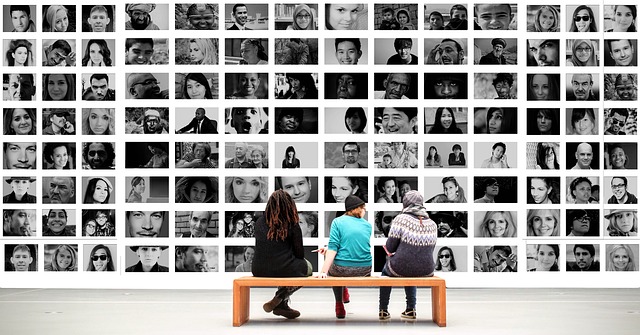By Sarah Grey Editors have a long tradition of defending accuracy and fairness. We want to do right by our clients and by readers. We value inclusivity. We want to be on the right side of history. Almost all social justice movements, whatever their focus, take up questions of language as part of the struggle for equality and freedom. When that happens, language change, which is usually a very gradual process, becomes conscious, deliberate, and much, much faster. Language and politics are forever catching up to one another, pushing and pulling against one another. Our job as editors is to help language catch up.
Editors have a long tradition of defending accuracy and fairness. We want to do right by our clients and by readers. We value inclusivity. We want to be on the right side of history. Almost all social justice movements, whatever their focus, take up questions of language as part of the struggle for equality and freedom. When that happens, language change, which is usually a very gradual process, becomes conscious, deliberate, and much, much faster. Language and politics are forever catching up to one another, pushing and pulling against one another. Our job as editors is to help language catch up.
There’s no one authority on inclusive language. We all have our own biases and knowledge gaps, and we can’t know what other people’s lives are like. People identify ways where language leaves them out or gets them wrong, and they speak up about it and start getting creative about alternatives and trying new things to see what catches on. It’s important for me to add here that there are debates about many of these things (such as people-first language in discussions of disability), so it’s important to stay up to speed on the debates that affect topics you edit.
Language changes because old words haven’t kept up with new realities, or realities that are newly being confronted. When you have the power of naming, you can frame how other people see you. You are literally setting the terms of the discussion. And that, in turn, allows you to put forward what you need in very material and tangible ways.
Etiquette
My grandmother always taught me that the goal of etiquette is to make sure every guest feels welcome and included. As editors it’s our job to see things from the reader’s point of view, not just our own or the author’s – and to welcome readers into the text and keep them reading. So editing for inclusive language is about understanding where language leaves some readers out and finding ways to invite them in.
But there’s a basic principle that underlies the idea of etiquette, of making people feel welcome, and it works very well when editing: treat people like they’re people. Don’t treat them like they’re lesser, like they’re unintelligent, like they don’t exist or don’t matter.
One way of doing this is othering: calling attention to someone’s differences from the unstated idea of ‘normal’: for example, referring to the Asian doctor or the trans librarian when ethnicity and gender aren’t relevant to the story, or dividing a catalogue page into ‘laptop bags’ and ‘women’s laptop bags’. This treats people from the othered group like a special exception whose identity has to revolve around their difference, or like they simply don’t exist, except perhaps in relation to someone more important.
For example, the Guardian recently tweeted the shortlist for the New Academy literary prize with the headline ‘Neil Gaiman and Haruki Muramaki up for alternative Nobel literature prize’. Only seven paragraphs in did the article mention that ‘the shortlist is completed with two female writers’, Maryse Condé and Kim Thúy.
 So this is something we can watch for as we edit – is everyone identified equally? Do the women have names? Does the interview ask everyone about their child-care arrangements, or only the women? It’s also common to see men’s names given with a full title and women’s titles omitted, as well as surnames for men and first names for women.
So this is something we can watch for as we edit – is everyone identified equally? Do the women have names? Does the interview ask everyone about their child-care arrangements, or only the women? It’s also common to see men’s names given with a full title and women’s titles omitted, as well as surnames for men and first names for women.
Do these slights in themselves hurt anyone? Yes and no. Small instances that might seem innocuous enough pile up. If you’re labelled as other, these microaggressions, as they’re called, happen over and over, and in patterns and in partnership with more violent incidents. Experience that enough and you begin to see how one feeds into the other.
Ethics
That brings us to ethics – because the way we as editors use language has serious consequences in the real world.
Our decisions can influence what the boundaries of normal, legitimate discourse are. Granted, when someone like Donald Trump is in power, those boundaries are pushed further and further out into the realm of the bizarre, but here we are. The boundaries of legitimate discourse can, depending on where we as a society place them, contribute to or even provide justification for physical violence. And while our decisions can’t shape the course of language change, we do have some influence over how language changes. And in that respect, the decisions we make truly do matter.
In the news media it’s especially noticeable when different words are used to describe the same things done by different people. Words carry assumptions and judgements: Are you a protestor or a rioter? Are you assertive or abrasive? Is your government an administration or a regime? The specifics of these terms vary from place to place depending on who has power. They also function as ‘dog whistles’, political code. When these saturate the media and find their way into people’s worldviews, that can have real consequences, including violence.
There are always competing narratives about any conflict, so when you’re editing material that deals with one, whether it’s intended to be neutral or takes a specific stance, you need to do your research and understand which terms are used by whom and whether terms imply a specific stance or are relatively neutral.
The term illegal alien, for example, sounds like it should refer to Klingons or Time Lords, but it’s been used since the 1990s to describe people arriving at the US–Mexico border from Central and South America. It has largely fallen out of mainstream use over the last decade or two, as human rights activists have pointed out that it is blatantly dehumanising. The AP Stylebook, the New York Times, and the American Library Association dropped the term, with the latter noting that it is ‘increasingly associated with nativist and racist sentiments’. Avoiding such inflammatory terms isn’t euphemism; it’s accuracy.
But this July, the federal Department of Justice sent an email to all US attorneys’ offices instructing them never to use the term ‘undocumented immigrants’ and instead refer only to ‘illegal aliens’. In the context of thousands of immigrant children under the age of five being separated from their parents and detained literally in cages, the federal government is taking steps to ensure that only the most dehumanising possible term is used. That’s not a coincidence. We see similar dehumanisation of migrants across Europe. Gerald Knaus of the European Stability Institute describes this as ‘a conscious policy to reintroduce language that was previously not acceptable in debate’. Obviously we can’t control what the politicians do, but we can push back when we see that sort of language being treated as normal discourse in the texts we edit.
We see similar dehumanisation of migrants across Europe. Gerald Knaus of the European Stability Institute describes this as ‘a conscious policy to reintroduce language that was previously not acceptable in debate’. Obviously we can’t control what the politicians do, but we can push back when we see that sort of language being treated as normal discourse in the texts we edit.
Customer service
As editors, it’s our job to help our clients convey a message to an audience and to remove anything that gets in the way of that message, like unintended sexual connotations or grammatical mistakes. That includes protecting them from making gaffes or inadvertently causing offence. Often these mistakes come from ignorance or thoughtlessness.
There are also times where the author might not actually be flat-out wrong, but still manages to distract the reader. (This is why I advise writers to stay away from the word niggardly, even though its etymological origins have nothing to do with the racial slur.)
This doesn’t mean that you have to make your clients’ writing bland or inoffensive. Nor does it mean that you should shrug off or ignore or cover up writing that’s problematic. What it means is that if your author is going to offend anyone, you want that to be intentional. As an editor I’m a proxy for the reader, and if something causes a strong reaction in me, I want to be absolutely sure that it’s the reaction the author was going for.
We also have a responsibility to keep our authors up to date. Just as we would correct them if they used outdated tech terms, we can do the same when it comes to social issues. We’re not here to shame our authors or tell them they’re doing it all wrong. We’re here to make the finished product better, so a little tact can go a long way.
I try to assume the best of intentions on the author’s part and start from there. Most of the time it will end with the client thanking you.
Tools
If you’re writing about a specific community, check for style guides published by advocacy groups. If you find yourself working a lot on a specific issue, consider compiling your own stylesheet to help you keep things straight.
If you’re still not clear on certain terms or ideas, though, don’t just ignore them: make the effort to learn. Read books, articles and blogs by prominent members of the community you want to learn more about, consume their art, follow them on social media, or talk to them in person. If you do more listening than talking, you’ll pick up on a lot, not just about what terms people are using but also how people in that community are affected as human beings by language. And if you really need in-depth information you can’t find on your own, consider hiring one of the many people who offer consulting on these issues.
What if you screw up? Try not to get defensive or make it about yourself; listen and try to understand it from the reader’s perspective. Speaking up about oppressive language can be stressful, so the person taking the risk of pointing out your error is doing you a favour. Respect that, learn from it and try to do better. It gets easier with practice.
The bottom line is that if you’re editing only the words on the page, you’re not being thorough. We also have to read – and edit – what’s between the lines. That’s what inclusive editing is all about.
 Sarah Grey is a freelance editor and writer at Grey Editing LLC in Philadelphia, USA, and the 2016 recipient of the American Copy Editors Society’s Robinson Prize for Excellence in Copyediting. Before becoming a full-time freelancer, Sarah spent several years in the translation industry, where she learned the importance of cultural sensitivity and of understanding a text’s audience. She specialises in academic nonfiction, social justice, and food writing.
Sarah Grey is a freelance editor and writer at Grey Editing LLC in Philadelphia, USA, and the 2016 recipient of the American Copy Editors Society’s Robinson Prize for Excellence in Copyediting. Before becoming a full-time freelancer, Sarah spent several years in the translation industry, where she learned the importance of cultural sensitivity and of understanding a text’s audience. She specialises in academic nonfiction, social justice, and food writing.
Posted by Abi Saffrey, CIEP blog coordinator.
The views expressed here do not necessarily reflect those of the CIEP.
